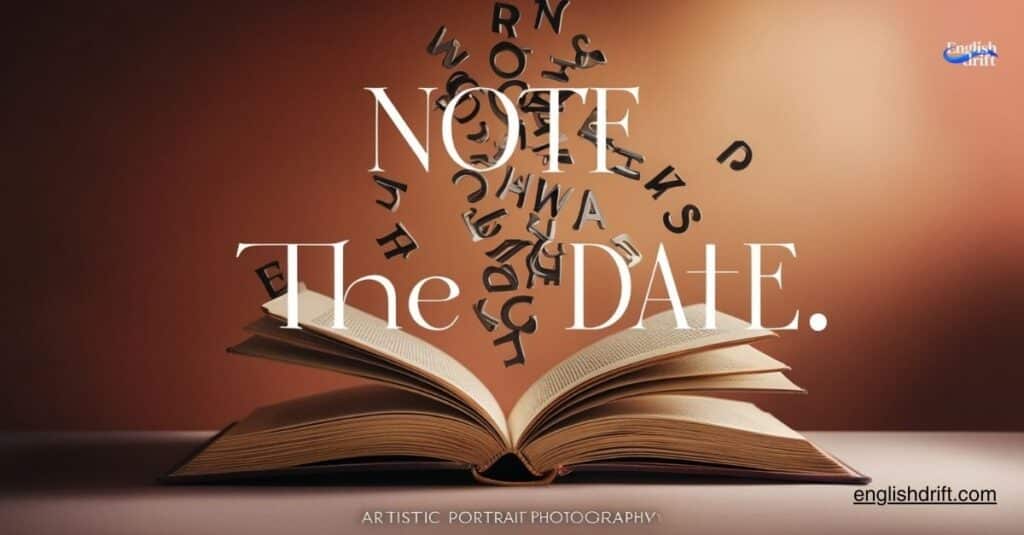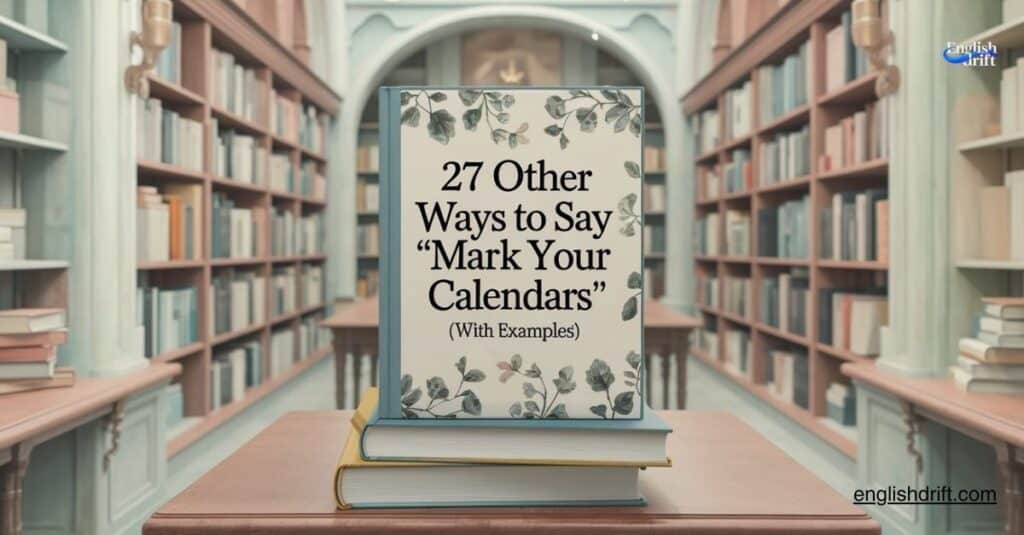Mark your calendar meaning: setting aside a specific date for an upcoming event or reminder, ensuring you won’t overlook it. When it comes to important dates or event reminders, a little creativity can make your invitation stand out.
Instead of the usual phrase, try one of these 27 fresh alternatives and mark your calendar meaning to fit any tone, from formal to friendly. Switching things up can add enthusiasm, professionalism, or a personal touch, whether you’re reminding friends or alerting colleagues.
So, elevate your calendar reminders and keep dates memorable with a phrase that perfectly matches the occasion!
Whether you need a formal reminder for a professional setting or a casual nudge for a friendly get-together, we’ve got you covered. This article includes examples, practical tips, and clear guidance on which phrase works best in different situations.
You’ll also find time management tips, event planning ideas, and ways to effectively add reminders to your calendar.
Why Finding Alternatives to “Mark Your Calendars” Enhances Communication
Finding fresh alternatives to “mark your calendars” does more than just avoid repetition—it tailors your message for the occasion, audience, and tone. Let’s look at some key reasons why changing up your language can make your event reminders more effective.
- Engagement: Using a different phrase can catch attention, especially in formal communication where phrases like “reserve this date” sound more professional and directive.
- Tone and Style: Whether you’re writing for a friend, a team, or a client, phrasing matters. For example, “highlight this day” can add a friendly touch, while “add it to your agenda” sounds more professional.
- Customization for Context: Some phrases work better in casual contexts, while others suit formal invitations or workplace settings. For example, “pencil this in” might be fine for a casual plan, but “reserve this date” feels more appropriate for formal invitations.
Understanding the mark your calendar meaning
Mark your calendar meaning: It’s all about noting down an important date to ensure you don’t forget it. Whether it’s a meeting, event, or deadline, marking your calendar helps you stay organized and on track. With the right reminder, you’ll always stay prepared and never miss an important occasion.
27 Alternative Ways to Say “Mark Your Calendars”
- Save the date
- Reserve this date
- Put this on your calendar
- Hold this date
- Schedule this in
- Note the date
- Block off this day
- Circle the date
- Keep the day open
- Don’t miss this
- Highlight this day
- Pencil this in
- Remember to be there
- Add it to your agenda
- Set a reminder for
- Put it in your planner
- Add this to your schedule
- Plan ahead for this date
- Don’t forget this date
- Lock in this date
- Remember this date
- Highlight this date
- Make a note of this date
- Schedule this on your calendar
- Flag this date
- Mark this down
- Take note of this day
Other Phrases to Use Instead of “Mark Your Calendars”
Here’s the list with each phrase as an H2 heading, plus examples and tips for each one.
Save the Date
- Example: “Save the date for our annual shareholder meeting on March 15th.”
- Example: “Please save the date for the conference on June 10th.”
- Tip: This is a classic phrase that works well in both formal and informal settings.
Reserve This Date
- Example: “Please reserve this date for an important client workshop on September 22nd.”
- Example: “Reserve this date for our office holiday party on December 15th.”
- Tip: Great for formal invitations or business emails, adding a polite, professional tone.
Put This on Your Calendar
- Example: “Put this on your calendar: quarterly review meeting on January 9th.”
- Example: “Put this on your calendar: team outing on April 5th.”
- Tip: Ideal for specific reminders, helping ensure people note it down.
Hold This Date
- Example: “We kindly ask that you hold this date for our awards ceremony next month.”
- Example: “Please hold this date for our team-building workshop on October 10th.”
- Tip: Adds a formal tone, making it great for significant events.
Schedule This In
- Example: “Please schedule this in as we’ll have a product presentation on May 12th.”
- Example: “Schedule this in for our performance review on November 4th.”
- Tip: Clear and direct, best for internal planning or team announcements.
Note the Date

- Example: “Kindly note the date for our year-end performance evaluation on December 1st.”
- Example: “Please note the date for the project update meeting on February 18th.”
- Tip: Simple and straightforward, works well in any context to ensure people remember the date.
Block Off This Day
- Example: “Please block off this day for our team strategy workshop.”
- Example: “Block off this day for our client presentation on July 14th.”
- Tip: Useful for entire-day events, emphasizing that people should keep the day clear.
Circle the Date
- Example: “Circle the date for our family reunion on August 10th!”
- Example: “Circle the date on your calendar: summer picnic on June 20th.”
- Tip: Adds a fun and informal touch, perfect for social gatherings.
Keep the Day Open
- Example: “Keep the day open for our beach day on July 5th.”
- Example: “Keep the day open for our holiday gathering on December 23rd.”
- Tip: Casual and friendly, ideal for events with friends or family.
Don’t Miss This
- Example: “Don’t miss this! We’re celebrating John’s birthday next Saturday.”
- Example: “Don’t miss this: family movie night on March 3rd.”
- Tip: Adds excitement and urgency, perfect for events people won’t want to miss.
Highlight This Day

- Example: “Highlight this day on your calendar: our annual barbecue on June 25th.”
- Example: “Highlight this day: book club meeting on April 8th.”
- Tip: Adds emphasis while staying casual, suitable for friendly gatherings.
Pencil This In
- Example: “Pencil this in for our book club meet-up on April 20th.”
- Example: “Pencil this in for our community cleanup on September 30th.”
- Tip: Soft and flexible, great for tentative plans that might change.
Remember to Be There
- Example: “Remember to be there: we’re doing a friends’ trip on March 8th.”
- Example: “Remember to be there for our backyard barbecue on July 17th.”
- Tip: Casual and friendly, works well for events with close friends or family.
Add It to Your Agenda
- Example: “Add it to your agenda: the weekly project review on Thursday at 3 PM.”
- Example: “Add it to your agenda: monthly performance meeting on March 15th.”
- Tip: Clear and actionable, best for professional settings or team reminders.
Set a Reminder For
- Example: “Set a reminder for our monthly team check-in next Wednesday.”
- Example: “Set a reminder for the budget review on January 20th.”
- Tip: Adds a sense of importance, ideal for reminders that need action.
Put It in Your Planner
- Example: “Make sure you put it in your planner—our brainstorming session is on the 17th.”
- Example: “Put it in your planner: client presentation on April 12th.”
- Tip: Effective for organized scheduling, best for work and project deadlines.
Add This to Your Schedule
- Example: “Please add this to your schedule: client feedback session on October 3rd.”
- Example: “Add this to your schedule for our group check-in on March 21st.”
- Tip: Direct and clear, great for team or project planning.
Plan Ahead for This Date
- Example: “Plan ahead for our annual team-building retreat on November 19th.”
- Example: “Plan ahead for the upcoming conference on May 3rd.”
- Tip: Emphasizes future planning, suitable for larger events.
Don’t Forget This Date
- Example: “Don’t forget this date: it’s the last day for early registration on April 30th!”
- Example: “Don’t forget this date: company anniversary celebration on June 10th.”
- Tip: Adds urgency, perfect for reminders people need to prioritize.
Lock in This Date
- Example: “Lock in this date—our launch party is set for January 21st!”
- Example: “Lock in this date for our product demo on September 5th.”
- Tip: High-energy and encouraging, ideal for exciting, can’t-miss events.
Remember This Date
- Example: “Remember this date as our big networking event is around the corner.”
- Example: “Remember this date for our charity fundraiser on October 18th.”
- Tip: Gentle and professional, works well for notable events or gatherings.
Highlight This Date
- Example: “Highlight this date in your calendar—our annual gala is on May 7th.”
- Example: “Highlight this date for our winter concert on December 2nd.”
- Tip: Adds visual emphasis, making it great for memorable or special occasions.
Make a Note of This Date
- Example: “Make a note of this date: the launch event on October 12th.”
- Example: “Please make a note of this date for our performance review on March 23rd.”
- Tip: Polite and professional, suitable for ensuring people remember important dates.
Schedule This on Your Calendar
- Example: “Please schedule this on your calendar: the team meeting on April 10th.”
- Example: “Schedule this on your calendar for our training session on November 5th.”
- Tip: Useful for formal reminders, emphasizing the importance of adding it to one’s schedule.
Flag This Date
- Example: “Flag this date for the annual sales conference on September 15th.”
- Example: “Please flag this date for our quarterly planning session on July 22nd.”
- Tip: Adds a sense of importance, ideal for business settings or critical events.
Mark This Down
- Example: “Mark this down: our office holiday party is on December 14th.”
- Example: “Please mark this down for our upcoming client meeting on January 25th.”
- Tip: Direct and simple, effective for quick reminders that people need to remember.
Take Note of This Day
- Example: “Take note of this day: our team celebration on August 18th.”
- Example: “Take note of this day for the awards ceremony on February 11th.”
- Tip: Adds a gentle reminder, suitable for both formal and informal occasions.
Practical Examples for Using These Phrases Across Different Scenarios
Workplace Emails
Emails to teams or departments often benefit from straightforward, professional language.
- Example: “Please add this to your agenda: the quarterly strategy session on December 15th.”
Event Invitations
Formal invitations or digital invites may include “Save the date” or “Reserve this date” to set the tone.
- Example: “Save the date for the community fundraiser on April 15th.”
Reminders and Follow-ups
Casual reminders are great for friendly nudges without sounding too formal.
- Example: “Don’t miss this—it’s our first game night of the season on January 22nd!”
| Context | Phrase | Example |
|---|---|---|
| Professional | “Hold this date” | “Hold this date for our annual review on June 1st.” |
| Casual | “Circle the date” | “Circle the date for our beach outing on July 8th.” |
| Emphatic | “Don’t forget this date” | “Don’t forget this date: final exams start May 10th!” |
Final Tips for Using These Phrases in Communication
- Tailor the Message: Small tweaks can add a personal touch and make your message more memorable. For example, “Save the date—it’s a celebration for the whole family!”
- Use Specific Details: Adding details, like a time and location, can help ensure the message is clear.
- Choose Words Based on Tone: Friendly words like “highlight” feel more casual, while “reserve” or “hold” feel more formal.
- Remember Your Medium: For emails, using phrases like “put this on your calendar” can sound more appropriate than casual phrases like “circle the date.”
Conclusion: Make Every Event Reminder Count
Switching up your language for mark your calendar meaning and calendar reminders does more than avoid repetition. It sets the tone for the event, helps organize attendees, and keeps your communication fresh and engaging. By using the mark your calendar meaning listed here, you can create reminders that fit the occasion perfectly—whether it’s a friendly meetup or a formal work event. Try out different phrases and see which ones feel most natural for your style.
The right language can make all the difference. So next time you plan an event, remember to pick the phrase that suits your purpose best and keep track of those important dates effortlessly.
READ MORE
- Thank You for Welcoming Me to the Team: 60+ Messages
- how to respond to make me : 60+ Replies You Need Right Now!
- 23 Professional Alternatives to “Happy to Help” (With Examples
- How to Respond to WSG (What’s Good)? 100+ Unique Replies
- how to say thank you for an unexpected gift : 100+ Massages
- 19 Other Ways to Say “In Conclusion” With Examples

Henry James is an experienced blogger at English Drift, specializing in English grammar and vocabulary. With a passion for language and clear communication, Henry helps readers enhance their writing skills through insightful guides and practical tips.







